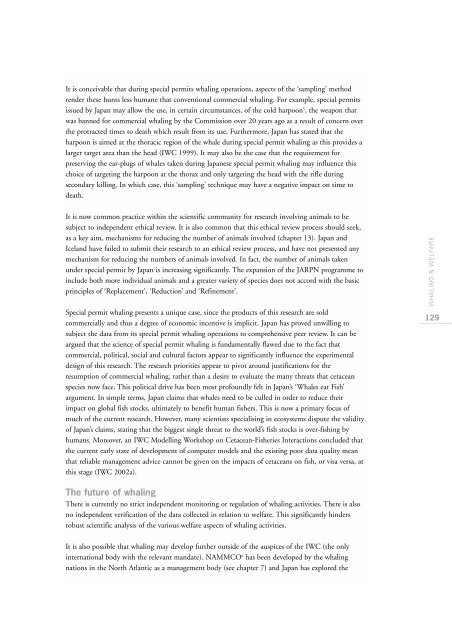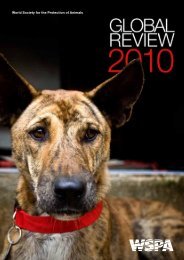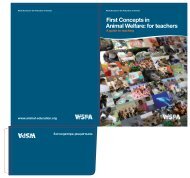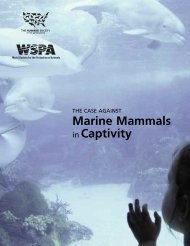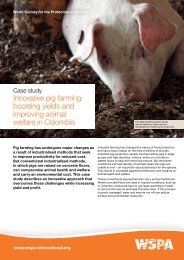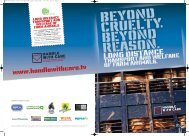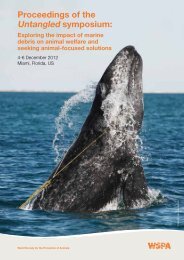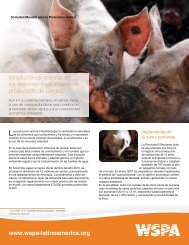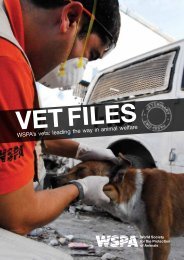It is conceivable that during special permits whaling operations, aspects of the ‘sampling’ methodrender these hunts less humane that conventional commercial whaling. For example, special permitsissued by Japan may allow the use, in certain circumstances, of the cold harpoon 5 , the weapon thatwas banned for commercial whaling by the Commission over 20 years ago as a result of concern overthe protracted times to death which result from its use. Furthermore, Japan has stated that theharpoon is aimed at the thoracic region of the whale during special permit whaling as this provides alarger target area than the head (IWC 1999). It may also be the case that the requirement forpreserving the ear-plugs of whales taken during Japanese special permit whaling may influence thischoice of targeting the harpoon at the thorax <strong>and</strong> only targeting the head with the rifle duringsecondary killing. In which case, this ‘sampling’ technique may have a negative impact on time todeath.It is now common practice within the scientific community for research involving animals to besubject to independent ethical review. It is also common that this ethical review process should seek,as a key aim, mechanisms for reducing the number of animals involved (chapter 13). Japan <strong>and</strong>Icel<strong>and</strong> have failed to submit their research to an ethical review process, <strong>and</strong> have not presented anymechanism for reducing the numbers of animals involved. In fact, the number of animals takenunder special permit by Japan is increasing significantly. The expansion of the JARPN programme toinclude both more individual animals <strong>and</strong> a greater variety of species does not accord with the basicprinciples of ‘Replacement’, ‘Reduction’ <strong>and</strong> ‘Refinement’.Special permit whaling presents a unique case, since the products of this research are soldcommercially <strong>and</strong> thus a degree of economic incentive is implicit. Japan has proved unwilling tosubject the data from its special permit whaling operations to comprehensive peer review. It can beargued that the science of special permit whaling is fundamentally flawed due to the fact thatcommercial, political, social <strong>and</strong> cultural factors appear to significantly influence the experimentaldesign of this research. The research priorities appear to pivot around justifications for theresumption of commercial whaling, rather than a desire to evaluate the many threats that cetaceanspecies now face. This political drive has been most profoundly felt in Japan’s ‘<strong>Whale</strong>s eat Fish’argument. In simple terms, Japan claims that whales need to be culled in order to reduce theirimpact on global fish stocks, ultimately to benefit human fishers. This is now a primary focus ofmuch of the current research. However, many scientists specialising in ecosystems dispute the validityof Japan’s claims, stating that the biggest single threat to the world’s fish stocks is over-fishing byhumans. Moreover, an IWC Modelling Workshop on Cetacean-Fisheries Interactions concluded thatthe current early state of development of computer models <strong>and</strong> the existing poor data quality meanthat reliable management advice cannot be given on the impacts of cetaceans on fish, or visa versa, atthis stage (IWC 2002a).WHALING & WELFARE129The future of whalingThere is currently no strict independent monitoring or regulation of whaling activities. There is alsono independent verification of the data collected in relation to welfare. This significantly hindersrobust scientific analysis of the various welfare aspects of whaling activities.It is also possible that whaling may develop further outside of the auspices of the IWC (the onlyinternational body with the relevant m<strong>and</strong>ate). NAMMCO 6 has been developed by the whalingnations in the North Atlantic as a management body (see chapter 7) <strong>and</strong> Japan has explored the
possibility of establishing a similar body in the Pacific. To some extent it may appear that thedevelopment of such bodies is a political ploy; a threat to the IWC if it does not develop in thedirection that the whalers desire. The question then arises as to how such bodies would take welfarematters into account.The face of whaling in the 21st Century is changing. There is already considerable ongoing whalingactivity occurring outside of the IWC <strong>and</strong> significant attempts to blur the distinction betweenaboriginal <strong>and</strong> commercial hunts. New categories of whaling are evolving to fill the niche ofconventional commercial whaling. One such category is special permit whaling (see chapter 13). It isalso feared that a change in Japanese law to permit the commercial sale of whales caught in nets mayprovide an incentive for fishermen (who have neither the training, nor the equipment), to kill ratherthan release ‘bycaught cetaceans’. The consumption of whales caught in nets is permitted in othercountries conducting whaling (see chapter 6). Other technological changes may include the use ofnoise to drive the animals 7 .The products of bycaught whales <strong>and</strong> whales taken under special permit are sold commercially inJapan, helping to stimulate the market for cetacean meat. This further promotes the market incetacean products, which is also filled by small cetacean hunts <strong>and</strong> further fuels the desire to tradecetacean products internationally.130A REVIEW OF THE WELFARE IMPLICATIONS OF MODERN WHALING ACTIVITIESWelfare potential of whaling operationsA killing method that is truly painless <strong>and</strong> causes minimum distress to the animal can be classified as‘humane slaughter’ <strong>and</strong>, therefore, a process with the potential for high welfare. From the analysis inchapter 12, it is clear that there are a number of factors inherent in current whale killing methodsthat mitigate against the potential for high welfare. These include the initial pursuit, <strong>and</strong> thedifficulties involved in hitting a distant, largely submerged, moving target from a moving platform atsea. The killing methods themselves are often not well adapted for the species taken, or the variabilityof size between individuals of the same species. The significance of these variables <strong>and</strong> theinadequacies of the methods used are reflected in the poor instantaneous death rates, <strong>and</strong> averagetimes to death, <strong>and</strong> the need for secondary killing methods during all types of whaling operation.In summary, when assessing the welfare potential of whale killing methods using accepted principlesof humane slaughter, it is clear that current whaling operations have a low welfare potential, <strong>and</strong> arelikely to cause pain <strong>and</strong> suffering in many hunted cetaceans.Other mammal huntsWhaling is sometimes compared to other mammal hunts <strong>and</strong> proponents of commercial whalingmay even suggest that whaling compares favourably with such other hunts. Comparisons of thisnature are highly contentious, inappropriate <strong>and</strong> outside of the scope of this book. However, twothings are noted: First, most whaling is unlike the majority of other mammal hunting because it is agovernment-sanctioned <strong>and</strong> financially supported activity. Therefore, governments can be expected toshoulder the responsibility for the associated welfare concerns.Second, a culture of change can be identified in the hunting of some other mammals, whereby bestmanagement practices (BMPs) are being adopted with the intent of giving attention to animalwelfare, safety for huntsmen, the public <strong>and</strong> other wild animals. These BMPs demonstrate that
- Page 5 and 6:
ForewordWhales are highly evolved a
- Page 7:
1 Executive SummaryThis review exam
- Page 11 and 12:
2 A background to whalingPhilippa B
- Page 13 and 14:
y the weapon’s enormous recoil, w
- Page 15 and 16:
Japan currently whales in the Antar
- Page 17 and 18:
Otto, K. 1997. Animal Pain Behaviou
- Page 19 and 20:
Protecting the welfare of animals i
- Page 21 and 22:
Toothed whales (Odontoceti)Toothed
- Page 23 and 24:
Social behaviourMother-calf pairsOn
- Page 25 and 26:
to store and pass on information to
- Page 27 and 28:
Communication in great whalesThe mo
- Page 29:
Self-awarenessOne of the most compe
- Page 32 and 33:
J.G.M. Thewissen), pp. 158-162. Aca
- Page 34 and 35:
Whitehead, H., Waters, S. and Lyrho
- Page 36 and 37:
humanitarian purposes the time take
- Page 38 and 39:
Welfare and the modern IWCFrom 1980
- Page 40 and 41:
1996 UK proposes guidelines for col
- Page 42 and 43:
Section TwoWhale killing6 Commercia
- Page 44 and 45:
Table 1 Commercial, special permit
- Page 46 and 47:
It can be argued that the figures f
- Page 48 and 49:
Since struck and lost whales can in
- Page 50 and 51:
equipment to Russian subsistence wh
- Page 52 and 53:
This is the time from the throwing
- Page 54 and 55:
Table 3 Aboriginal Subsistence Whal
- Page 56 and 57:
International Aid For Korean Animal
- Page 58 and 59:
29 In Resolution 1999-1, the IWC no
- Page 60 and 61:
For example, Greenland and the Faro
- Page 62 and 63:
the past they made an important con
- Page 64 and 65:
however, has been made on the exten
- Page 66 and 67:
hunt indicate that the whales are s
- Page 68 and 69:
8 Weather, sea condition and shipmo
- Page 70 and 71:
chance of fog decreases from 15 to
- Page 72 and 73:
experienced in December, or y could
- Page 74:
9 The potential stress effects ofwh
- Page 77 and 78:
Both chase and pursuit cause stress
- Page 79 and 80:
and manifest in a series of lethal
- Page 81 and 82:
Ridgeway, S. H. (1966). Dall porpoi
- Page 83 and 84: 10 Euthanasia of cetaceansPhilippa
- Page 85 and 86: for the task. The correct target ar
- Page 87 and 88: whales the size of minke whales (Ø
- Page 89 and 90: 11 Review of criteria for determini
- Page 91 and 92: It is apparent from Figure 1, that,
- Page 93 and 94: interpreted criteria, comparisons o
- Page 95 and 96: 90A REVIEW OF THE WELFARE IMPLICATI
- Page 97 and 98: 12 A comparison betweenslaughterhou
- Page 99 and 100: include levels of premature mortali
- Page 101 and 102: the emphasis during some whaling op
- Page 103 and 104: affect an immediate and thereby law
- Page 105 and 106: Table 1 Animal welfare and the Sche
- Page 107 and 108: CIWF Trust, 2002. Farm Assurance Sc
- Page 109 and 110: 13 Ethics and whaling under special
- Page 111 and 112: Table 1. Consideration of the 3Rs i
- Page 113 and 114: skin samples, without the need for
- Page 115 and 116: IWC (2001) Report of the Scientific
- Page 117 and 118: Whales and the lawCetaceans (and wh
- Page 119 and 120: scientific and technical committees
- Page 121 and 122: ASCOBANS came into force in 1994. F
- Page 123 and 124: The Treaty of the Panama Canal, ena
- Page 125 and 126: 2 As a result, their need for prote
- Page 127 and 128: law says, but also the extent to wh
- Page 129 and 130: 15 Whaling and welfarePhilippa Brak
- Page 131 and 132: commercial whaling. Times to death
- Page 133: eath). Using the current criteria t
- Page 137 and 138: international customary law and exi
- Page 139 and 140: 16 Summary of conclusionsModern day
- Page 141 and 142: Glossary136A REVIEW OF THE WELFARE
- Page 143 and 144: 138A REVIEW OF THE WELFARE IMPLICAT
- Page 145 and 146: Appendix IIColour plates©Mark Voti
- Page 147 and 148: 142A REVIEW OF THE WELFARE IMPLICAT
- Page 149 and 150: Figure 13. Processing minke whales


